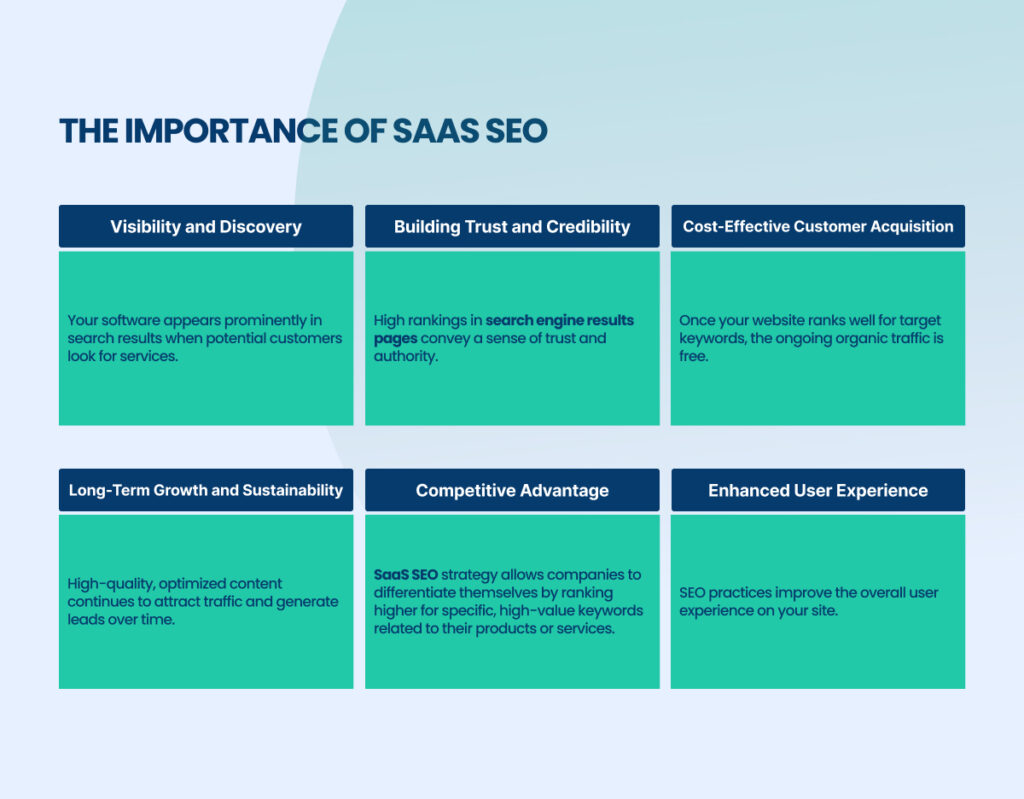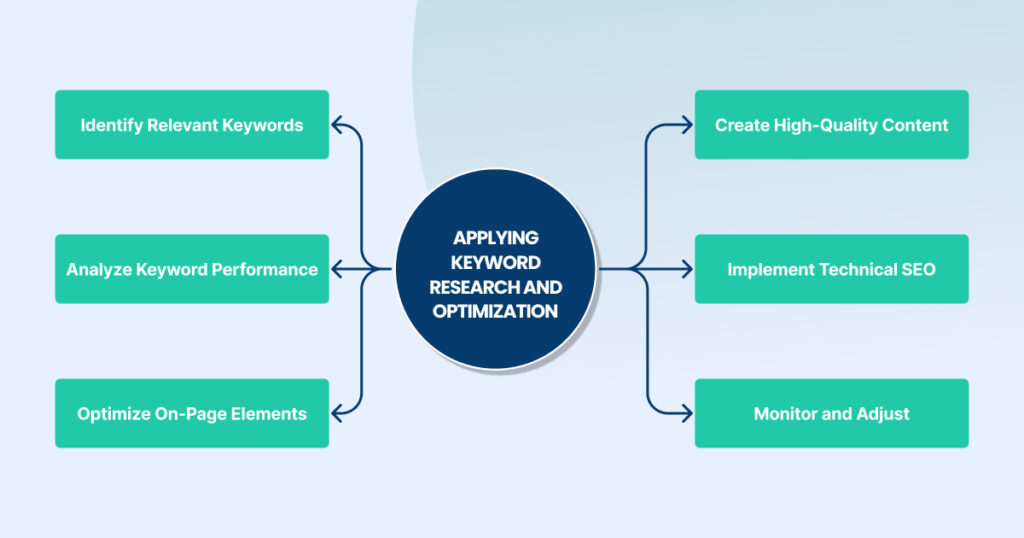In the competitive field of Software as a Service (SaaS), achieving visibility and attracting a steady stream of potential customers is critical to a company’s success.
Search Engine Optimization, SaaS SEO, is an authoritative tool that can precisely enhance the visibility of SaaS products in search engine results, driving organic traffic and boosting user acquisition.
Source: SEMrush
Investing in a robust SEO strategy is crucial for SaaS companies searching to enhance their online presence.
Consider reading this blog post for more detailed insights into how SaaS SEO can transform your business.
The Role of SEO in SaaS: Why It’s Crucial for Business Success
In the fast-paced world of Software as a Service (SaaS), achieving visibility amidst a sea of competitors is vital for success.
SEO (Search Engine Optimization) ensures that SaaS companies can productively reach and engage their target audiences.
Unlike other sectors, the SaaS industry relies heavily on digital presence to attract, convert, and retain customers. This makes a robust SaaS SEO strategy indispensable for any software company looking to thrive in the digital marketplace.
SEO is the method of optimizing a website to rank higher in search engine results pages (SERPs) for relevant keywords. This visibility is crucial for SaaS companies because their target customers are predominantly found online.
When potential users search for solutions to their problems, they typically turn to search engines like Google. Being visible on the first page of search results can significantly influence a user’s decision-making process, leading to higher traffic and conversion rates.
An SEO agency can provide specialized services to help SaaS companies achieve and maintain these high search engine rankings.
Importance of SaaS SEO

Key Components of SaaS SEO
Successful SaaS SEO hinges on two main pillars: understanding what your target audience is looking for (keyword research) and then optimizing your website and content to be relevant and trustworthy to search engines (on-page and technical SEO).
Keyword Research and Optimization: The Backbone of SEO Success
Keyword research and optimization are foundational elements of any successful SEO strategy, particularly for SaaS companies searching to enhance their online visibility and attract targeted traffic.
Understanding and implementing these practices effectively can significantly boost search engine rankings, drive more qualified leads, and ultimately grow your business.
Importance of Keyword Research

Keyword research involves identifying the specific words and phrases that prospective customers use when searching for services or products related to your business.
Source: SEMrush
For SaaS businesses, this means pinpointing the terms their target audience will likely use while looking for software solutions. This process is crucial for several reasons:
- Targeted Traffic: Concentrating on keywords that align closely with your product offerings and user intent attracts visitors who are more likely to convert into customers. This targeted traffic is essential for SaaS companies, where the buying decision often involves significant research and consideration.
- Understanding Market Demand: Keyword research provides insights into what prospective customers are searching for, helping you understand market demand and identify opportunities. This can inform content creation, product development, and marketing strategies, ensuring they align with what users are actively seeking.
- Competitive Analysis: Identifying which keywords competitors rank for can reveal gaps in their strategy and opportunities for your business to differentiate itself. This insight allows SaaS companies to craft content that addresses unmet needs and outperforms competitors in search results.
Applying Keyword Research and Optimization
Effective keyword research and optimization involve several key steps, each contributing to a robust SEO strategy:
For SaaS businesses, effective keyword research and optimization are essential for attracting targeted traffic and achieving high search engine rankings. Understanding what potential customers are looking for and connecting your content to meet these needs can significantly enhance your online visibility and drive sustained growth.
The Power of Content Marketing in SaaS: Driving Growth and Engagement
Content marketing has become indispensable for SaaS companies aiming to establish a strong online presence, attract and retain customers, and clearly drive business growth.
In the SaaS landscape, where users rely heavily on digital content to inform their buying actions, crafting a robust content marketing strategy is beneficial and essential.
Why Content Marketing is Essential
Content is the backbone of digital marketing, providing value to potential customers at every stage of their journey.
For SaaS businesses, content serves multiple purposes: it educates users about complex software solutions, showcases the product’s benefits and features, and builds trust with the audience.
- Educational Value: SaaS products are often complex, and potential customers need to understand how they work and how they can solve their problems.
Source: Ahrefs
High-quality content such as blog posts, whitepapers, tutorials, and case studies can demystify these solutions and provide the necessary information to guide users through their decision-making process.
- SEO and Visibility: Creating content optimized for target keywords with significant search volume helps improve a SaaS website‘s ranking on search engines. By matching content with what potential customers are searching for, SaaS companies can attract organic traffic to their sites.
SEO for SaaS is particularly critical because it ensures that the content is findable by search engines, driving sustained, high-quality traffic over time.

When users consistently find answers and solutions on your site, they are more likely to trust your brand and consider your product. This trust is crucial in a market where the commitment to a software solution often involves significant investment and long-term use.
- Lead Generation and Nurturing: Content marketing is a powerful tool for attracting and converting leads.
SaaS companies can build a list of potential customers by offering gated content like eBooks or webinars in exchange for contact information. Nurturing these leads with targeted content helps move them through the sales funnel, from awareness to evaluation to decision.
The Role of Content in SaaS Businesses
For SaaS companies, content is more than just a marketing tool; it is a critical component of the product experience.
Users often rely on content to learn about the software, understand how to use it effectively, and troubleshoot issues. Comprehensive documentation, tutorials, and support articles enhance the overall user experience and minimize the burden on customer support teams.
Moreover, content marketing supports other marketing efforts such as email marketing, social media campaigns, and inbound marketing strategies. Well-crafted content can be repurposed across these channels to amplify its reach and impact.
Understanding Technical SEO in SaaS Businesses
Technical SEO is a crucial aspect for a saas business to optimizing a SaaS website for better visibility and activity in search engine results. It involves enhancing the technical elements of a site to ensure that search engines can efficiently crawl, index, and rank the website.
Focusing on technical SEO is essential for SaaS businesses. It directly impacts the site’s usability, load speed, and overall user experience, which are key factors for both search engines and users.
- Site Structure and Navigation: A well-organized site structure makes it convenient for search engines to crawl your site and understand its content. This involves creating a logical hierarchy of pages and implementing clear navigation paths.

For SaaS websites, this means structuring pages to guide users smoothly from product descriptions to sign-up forms and support resources. Clear navigation also reduces bounce rates and improves user engagement, which are critical metrics tracked by Google Analytics.
- Page Speed Optimization: Fast-loading pages are essential for user satisfaction and SEO. Slow websites can make users afraid and lead to higher bounce rates.
Technical SEO practices such as optimizing images, leveraging browser caching, and minimizing server response times are vital for improving page speed.
For SaaS companies, ensuring that the product and informational pages load quickly is crucial, as potential customers often decide based on their initial experience on the site.
- Mobile-Friendly Design: With an essential portion of web traffic getting from mobile devices, having a mobile-friendly design is no longer optional. Technical SEO includes optimizing a site’s responsiveness to ensure it performs well on various devices and screen sizes.
For SaaS businesses, this means providing a seamless experience across desktops, tablets, and smartphones, which can be a decisive factor in user retention and conversion.
- Secure Connections (HTTPS): Security is a priority for search engines and users alike. Implementing HTTPS guarantees that the information shared between the user and the site is encrypted and secure.
For SaaS businesses, which often handle sensitive customer data, using HTTPS is crucial not only for security but also as a ranking factor in search engines.
- On-Page SEO Elements: Technical SEO also involves optimizing on-page components such as meta tags, header tags, and URLs.
This ensures that each page on a SaaS website corresponds to specific search queries and contributes to the overall SEO strategy. Proper use of keywords in titles, descriptions, and headers enhances the chances of the page ranking for those terms.
- XML Sitemaps and Robots.txt: Providing search engines with XML sitemaps helps them understand the site’s structure and discover all relevant pages.
Meanwhile, the robots.txt file directs search engine crawlers on which pages to crawl or escape. For SaaS companies, maintaining up-to-date sitemaps and robots.txt files is crucial for efficient indexing and avoiding duplicate content issues.
Leveraging Technical SaaS SEO
Implementing effective technical SEO practices is critical for SaaS businesses aiming to achieve and maintain high search engine rankings.
By highlighting technical aspects such as site structure, speed, mobile compatibility, security, and on-page optimization, SaaS companies can ensure their websites are both user-friendly and search engine-friendly.
Monitoring these efforts through tools like Google Analytics allows businesses to continuously refine their strategies and stay ahead in the competitive digital landscape. In the realm of SEO for SaaS, technical SEO forms the foundation upon which successful online visibility and user engagement are built.
Understanding Backlink Building and Its Importance in SEO
Backlink building, also well famous as link building, is an essential aspect of SEO that involves acquiring hyperlinks from other websites to your own. These backlinks are considered as votes of confidence by search engines like Google, signaling that your content is valuable and authoritative.
Source: SEMrush
For SaaS businesses, effective backlink building can significantly enrich online visibility, boost search engine rankings, and drive more organic traffic to their SaaS website. Here’s a closer look at why backlink building is essential and how to implement it effectively.
How to Build Effective Backlinks
- Create High-Quality Content: The core of any outstanding backlink strategy is valuable, shareable content. This could include in-depth guides, research reports, case studies, or infographics.
High-quality content naturally attracts backlinks as other sites find it useful to reference and share. - Guest Blogging: Writing articles for other reputable sites in your industry can help you gain exposure and backlinks. When you contribute valuable insights to other blogs, you often get the opportunity to include a link back to your own site.
This not only provides a backlink but also positions you as an authority in your field. - Outreach Campaigns: Proactively reaching out to websites and blogs in your industry to contribute to your content can be a productive way to build backlinks.
Personalizing your outreach and highlighting how your content adds value to their readers increases the likelihood of them linking to your site. - Leverage Influencer and Partner Networks: Collaborating with influencers and partners who have established online presences can boost your backlink profile. They can share your content with their audiences, providing valuable backlinks and increasing your reach.
- Utilize Broken Link Building: This technique consists of finding broken links on other web pages and offering your content as a replacement. By helping site owners fix these issues, you can earn backlinks to your relevant content.
Tools like Ahrefs or SEMrush can help identify broken links related to your niche. - Monitor Competitors’ Backlinks: Analyzing the backlink profiles of your competitors can uncover opportunities for your own link-building efforts.
Tools like Moz and Ahrefs allow you to see where your competitors are getting their backlinks, enabling you to target similar sources
Partner with [A] Growth Agency
Struggling to attract qualified leads? Elevate your SaaS business with [A] Growth Agency‘s expert SEO strategies.
Our experienced specialists will help you to enhance your visibility, drive high-quality traffic, and achieve sustainable growth. We leverage comprehensive analytics and data is at our hearts.
Partner with us to optimize your SaaS SEO and dominate the search engine rankings.
Let’s explore your potential together.

